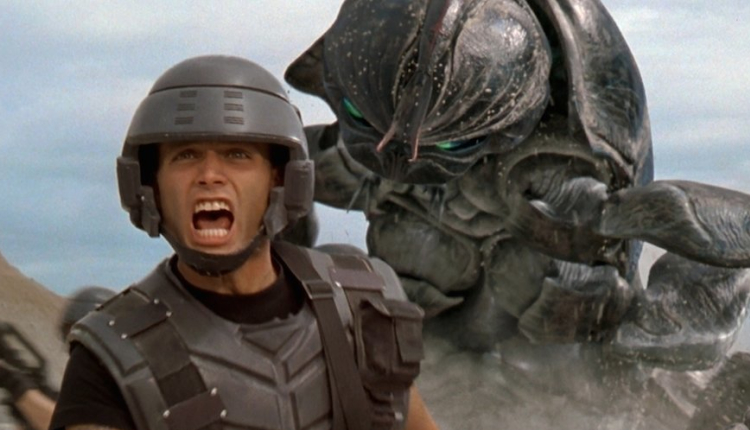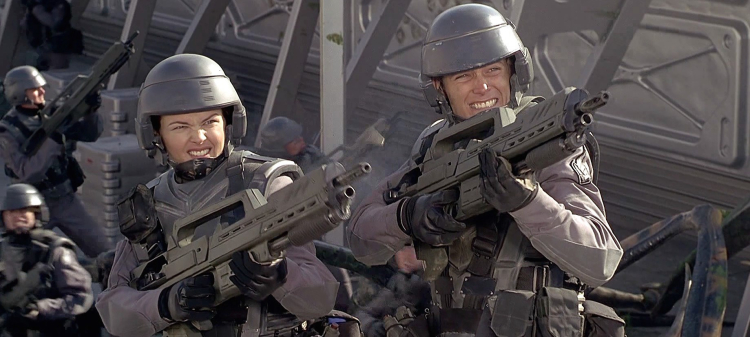Fascism, Satire and Subversion of Hollywood | Starship Troopers Turns 20
‘What if the Nazis had won the war?‘ It’s a question beloved of hack writers and dudes that make alt history maps on the Internet alike. What would the victorious Reich have done? Among other things they’d probably have made films like Starship Troopers.
Paul Verhoeven’s 1997 Sci-Fi War epic has built up a following since its release 20 years ago today. On its debut many viewers were baffled by a big budget bug hunt that seemed half soap opera, half tentpole B-movie. Critics, too, struggled to make sense of it. Roger Ebert at least seemed to get it but not care for it while Peter Travers in ‘Rolling Stone’ failed to like or understand the movie he watched. It is both funny and absolutely terrifying that a film that so openly embraced Fascist aesthetics seemed, to many, to be a normal Hollywood product.
Starship Troopers arrived at a point in Verhoeven’s career where he had already helmed extravagant, often satirical, smash hit action movies like Robocop and Total Recall as well as the much mocked (but now somewhat rehabilitated) flop Showgirls. Starship Troopers, if anything, takes his love for big, broad satire and amps it up to the point where showing the world a glimpse of Sharon Stone’s crotch in Basic Instinct seems subtle. In adapting the novel by Robert A Heinlein (an actual, not-at-all ironic fascist) Verhoeven – a man that grew up in Nazi occupied Holland – and screenwriter Edward Neumeier chose to embrace and explore, rather than tone down, the propagandistic wet dream aspects of the source material.
The story concerns a war between a future human society and an alien insect menace. The future utopia is clean, populated almost exclusively by white people with sharp cheekbones, perfect teeth and vacant stares. Only those that have served in the military can vote and ‘civilian’ is used as a term of derision. The outside threat, despite what some peaceniks say, attacked us without due provocation and now must be exterminated. We follow young Johnny Rico (Casper Van Dien) and an assortment of creepily beautiful classmates as they enrol to fight for the survival of their race. Along the way we follow a melodramatic love triangle through mountains of corpses, both human and bug. It is an all out romp that focuses as much on the two women in Rico’s life; Dizzy (Dina Meyer) and Carmen (Denise Richards) as all the CGI carnage.
[perfectpullquote align=”right” cite=”” link=”” color=”#F42A2A” class=”” size=”17"]It acknowledges that war and Fascism might be a perverse type of fun. It gives you license to be a sadist, to travel the world, meet new species and kill them.[/[/perfectpullquote]i>
The romance element is purposefully rote and stereotypical, echoing the fakey love stories so hated by lefties and critics from time immemorial. This is a brilliantly subversive move by Verhoeven and Neumeier. When we think of Nazi propaganda we probably think of Leni Riefenstahl or Jud Süß but forget that the most popular film of the period was called The Great Love. The second most popular was another romance called Request Concert. Both concern romance among handsome Aryans as they try to find love while doing their duty for the Fatherland. Audiences, as Goebbels was well aware, cared more about when the two leads might kiss than matters of ideology. This made melodrama the perfect vehicle to sneakily feed the party line to the population.
The film is, of course, aesthetically fascist in more obvious ways. Where the Nazis likened their supposed racial enemies to rats, here we have bugs. The foe is un-human, unworthy of sympathy, threatening, both mindless and paradoxically sneaky. The film glories in war as a force that forges young people into heroic adults. Verhoeven sprinkles overt propaganda video inserts throughout, a technique he had already used in Robocop. These pieces work as exposition but also show rows of perfect soldiers, hardworking scientists and a home front where women maniacally applaud as their kids shmush cockroaches so as to ‘do their part‘. Each ends with the clickbait worthy line of ‘Would you like to know more?‘ It may as well be the military asking you to ‘like and subscribe’.
The film is also fascistic in subtler ways (is that a paradox?) The initial setting, Buenos Aires, is portrayed as almost all white in what perhaps feels like a nod to Germans settling there upon fleeing the Allies. If there are degrees of nuance here the marketing team did not care to promote them. TV trailers un-ironically had arachnids exploding to the sounds of Blur’s ‘Song 2‘ as a deep, smokey voice assured us that ‘They messed with the wrong species‘. Woo-hoo.

Maybe most importantly, Starship Troopers is fun. At 12 I did not appreciate the nods to the propaganda of dead regimes. I appreciated that killing space monsters looked like a blast. In much the same way that James Bond makes the idea of being an alcoholic murderer who can’t keep his dick in his pants and works in the service of a blood soaked Empire look like jolly hijinks, Starship Troopers makes the thought of seeing your friends ripped apart by eight foot spiders in an space war seem like an adventure. When Rico is about to turn his back on the military he hears a commotion and runs to a friend, asking him what’s happening. The reply ‘It’s war! We’re going to war!‘ is delivered not with apprehension but with elation. It acknowledges that war and Fascism might be a perverse type of fun. It gives you license to be a sadist, to travel the world, meet new species and kill them. Along the way maybe you’ll have thrilling sex, maybe you’ll die heroically. It appeals to our worst impulses. A recurring war cry is ‘Come on you apes, you wanna live forever?‘ This quote is paraphrasing a US Sergeant in WW1 who originally shouted it as he lead his inexperienced men into a German machine gun nest as part of a pointless Imperial squabble. But isn’t it a cool line though? Isn’t it invigorating? Isn’t it fun?
For all the above, Starship Troopers has surprisingly progressive gender politics. Sexism is entirely absent. Women play sports, serve and shower with men, all without remark. Being cynical, one could argue that this is just a reason to show soapy tits during the unisex bathroom scenes. However Verhoeven, while crazier than a shithouse rat, is an earnest feminist. On the directors commentary he lamented that test audiences hated that Rico ultimately ends up with the woman that left him to pursue her career. The director thought he was being a good feminist by letting her pursue her ambitions unpunished. The rival love interest, Dizzy, was male in the novel but gender flipped in the screenplay. When a male general fails he is replaced by a more competent female commander. These genderblind, open minded choices feel strange when placed in the middle of all this reaction. It is possible that this is a tactic used to make us cheer the badass women before we realise that they are badasses in the service of a horrible, higher goal. Perhaps this is as much about liberal democracies’ fascist tendencies as much as the historical Nazi period. After all, the aforementioned propaganda inserts echo Frank Capras Why We Fight as much as they do Triumph of the Will and the troops run screaming into battle under the banner of a Navajo, rather than a German, eagle. Many desert planet set pieces resemble that founding myth of the US of A; Western movies. If the film’s feminism is a mistake it’s an interesting one. If it’s part of a rug pull it approaches genius. With Verhoeven its often hard to tell.

Much of Starship Troopers can be characterised as one big misdirect. As we cheer the derring do of the canon fodder we only get a few really overt winks that let us know the filmmakers anti-war sentiments. (A man with no legs and a prosthetic arm shakes Rico’s hand, exclaiming ‘Mobile Infantry made me the man I am today!‘) While the audience is distracted by love stories, action scenes and special effects the most important character may be off screen. The initial nerd of the group is played by Neil Patrick Harris. In ’97 Harris was still best known as Dougie Howser; a young, upstanding, blue eyed, blonde haired, young man. His character, Jenkins, signs up as a potentially gifted psychic. As he climbs the ranks he only occasionally appears on screen. On each appearance his outfit gets more and more sinister until he finally arrives in a barely modifed SS uniform to read the mind of a quivering, captured bug and proclaim ‘It’s afraid!’ to cheers from the assembled troops. It is at that point that, you’d hope, everyone would get the joke. We’ve been cheering the wrong side. War made fascists of us all.
Verhoeven is an odd man. He’s a thoughtful guy who co-authors books about the historical Jesus and makes films that serve as violent titillation and provocative think piece fodder all at once and that sometimes, miraculously, make millions of dollars. Starship Troopers was only a modest financial hit but by melding the tropes of Nazi art and mainstream Hollywood together he created one of the most subversive, if not the most subversive studio film of all time. It is simultaneously OTT action, cheesy teen romance, sledgehammer satire and a piece that challenges and mocks both its audience and financiers. 20 years on the war is never-ending and everything is awesome on the Western front.

